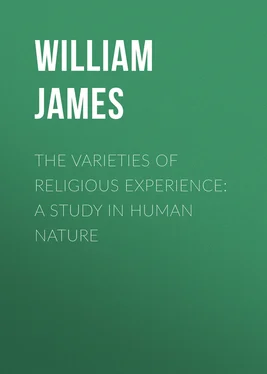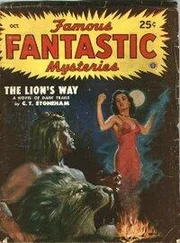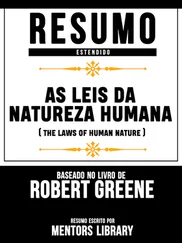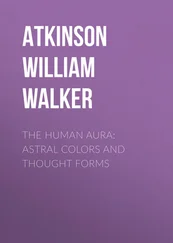William James - The Varieties of Religious Experience - A Study in Human Nature
Здесь есть возможность читать онлайн «William James - The Varieties of Religious Experience - A Study in Human Nature» — ознакомительный отрывок электронной книги совершенно бесплатно, а после прочтения отрывка купить полную версию. В некоторых случаях можно слушать аудио, скачать через торрент в формате fb2 и присутствует краткое содержание. Жанр: foreign_prose, foreign_religion, Философия, foreign_psychology, foreign_antique, на английском языке. Описание произведения, (предисловие) а так же отзывы посетителей доступны на портале библиотеки ЛибКат.
- Название:The Varieties of Religious Experience: A Study in Human Nature
- Автор:
- Жанр:
- Год:неизвестен
- ISBN:нет данных
- Рейтинг книги:4 / 5. Голосов: 1
-
Избранное:Добавить в избранное
- Отзывы:
-
Ваша оценка:
- 80
- 1
- 2
- 3
- 4
- 5
The Varieties of Religious Experience: A Study in Human Nature: краткое содержание, описание и аннотация
Предлагаем к чтению аннотацию, описание, краткое содержание или предисловие (зависит от того, что написал сам автор книги «The Varieties of Religious Experience: A Study in Human Nature»). Если вы не нашли необходимую информацию о книге — напишите в комментариях, мы постараемся отыскать её.
The Varieties of Religious Experience: A Study in Human Nature — читать онлайн ознакомительный отрывок
Ниже представлен текст книги, разбитый по страницам. Система сохранения места последней прочитанной страницы, позволяет с удобством читать онлайн бесплатно книгу «The Varieties of Religious Experience: A Study in Human Nature», без необходимости каждый раз заново искать на чём Вы остановились. Поставьте закладку, и сможете в любой момент перейти на страницу, на которой закончили чтение.
Интервал:
Закладка:
Compare now this mood with that of the old Christian author of the Theologia Germanica:—
“Where men are enlightened with the true light, they renounce all desire and choice, and commit and commend themselves and all things to the eternal Goodness, so that every enlightened man could say: ‘I would fain be to the Eternal Goodness what his own hand is to a man.’ Such men are in a state of freedom, because they have lost the fear of pain or hell, and the hope of reward or heaven, and are living in pure submission to the eternal Goodness, in the perfect freedom of fervent love. When a man truly perceiveth and considereth himself, who and what he is, and findeth himself utterly vile and wicked and unworthy, he falleth into such a deep abasement that it seemeth to him reasonable that all creatures in heaven and earth should rise up against him. And therefore he will not and dare not desire any consolation and release; but he is willing to be unconsoled and unreleased; and he doth not grieve over his sufferings, for they are right in his eyes, and he hath nothing to say against them. This is what is meant by true repentance for sin; and he who in this present time entereth into this hell, none may console him. Now God hath not forsaken a man in this hell, but He is laying his hand upon him, that the man may not desire nor regard anything but the eternal Good only. And then, when the man neither careth for nor desireth anything but the eternal Good alone, and seeketh not himself nor his own things, but the honour of God only, he is made a partaker of all manner of joy, bliss, peace, rest, and consolation, and so the man is henceforth in the kingdom of heaven. This hell and this heaven are two good safe ways for a man, and happy is he who truly findeth them.” 16
How much more active and positive the impulse of the Christian writer to accept his place in the universe is! Marcus Aurelius agrees to the scheme—the German theologian agrees with it. He literally abounds in agreement, he runs out to embrace the divine decrees.
Occasionally, it is true, the Stoic rises to something like a Christian warmth of sentiment, as in the often quoted passage of Marcus Aurelius:—
“Everything harmonizes with me which is harmonious to thee, O Universe. Nothing for me is too early nor too late, which is in due time for thee. Everything is fruit to me which thy seasons bring, O Nature: from thee are all things, in thee are all things, to thee all things return. The poet says, Dear City of Cecrops; and wilt thou not say, Dear City of Zeus?” 17
But compare even as devout a passage as this with a genuine Christian outpouring, and it seems a little cold. Turn, for instance, to the Imitation of Christ:—
“Lord, thou knowest what is best; let this or that be according as thou wilt. Give what thou wilt, so much as thou wilt, when thou wilt. Do with me as thou knowest best, and as shall be most to thine honour. Place me where thou wilt, and freely work thy will with me in all things.... When could it be evil when thou wert near? I had rather be poor for thy sake than rich without thee. I choose rather to be a pilgrim upon the earth with thee, than without thee to possess heaven. Where thou art, there is heaven; and where thou art not, behold there death and hell.” 18
It is a good rule in physiology, when we are studying the meaning of an organ, to ask after its most peculiar and characteristic sort of performance, and to seek its office in that one of its functions which no other organ can possibly exert. Surely the same maxim holds good in our present quest. The essence of religious experiences, the thing by which we finally must judge them, must be that element or quality in them which we can meet nowhere else. And such a quality will be of course most prominent and easy to notice in those religious experiences which are most one-sided, exaggerated, and intense.
Now when we compare these intenser experiences with the experiences of tamer minds, so cool and reasonable that we are tempted to call them philosophical rather than religious, we find a character that is perfectly distinct. That character, it seems to me, should be regarded as the practically important differentia of religion for our purpose; and just what it is can easily be brought out by comparing the mind of an abstractly conceived Christian with that of a moralist similarly conceived.
A life is manly, stoical, moral, or philosophical, we say, in proportion as it is less swayed by paltry personal considerations and more by objective ends that call for energy, even though that energy bring personal loss and pain. This is the good side of war, in so far as it calls for “volunteers.” And for morality life is a war, and the service of the highest is a sort of cosmic patriotism which also calls for volunteers. Even a sick man, unable to be militant outwardly, can carry on the moral warfare. He can willfully turn his attention away from his own future, whether in this world or the next. He can train himself to indifference to his present drawbacks and immerse himself in whatever objective interests still remain accessible. He can follow public news, and sympathize with other people's affairs. He can cultivate cheerful manners, and be silent about his miseries. He can contemplate whatever ideal aspects of existence his philosophy is able to present to him, and practice whatever duties, such as patience, resignation, trust, his ethical system requires. Such a man lives on his loftiest, largest plane. He is a high-hearted freeman and no pining slave. And yet he lacks something which the Christian par excellence , the mystic and ascetic saint, for example, has in abundant measure, and which makes of him a human being of an altogether different denomination.
The Christian also spurns the pinched and mumping sick-room attitude, and the lives of saints are full of a kind of callousness to diseased conditions of body which probably no other human records show. But whereas the merely moralistic spurning takes an effort of volition, the Christian spurning is the result of the excitement of a higher kind of emotion, in the presence of which no exertion of volition is required. The moralist must hold his breath and keep his muscles tense; and so long as this athletic attitude is possible all goes well—morality suffices. But the athletic attitude tends ever to break down, and it inevitably does break down even in the most stalwart when the organism begins to decay, or when morbid fears invade the mind. To suggest personal will and effort to one all sicklied o'er with the sense of irremediable impotence is to suggest the most impossible of things. What he craves is to be consoled in his very powerlessness, to feel that the spirit of the universe recognizes and secures him, all decaying and failing as he is. Well, we are all such helpless failures in the last resort. The sanest and best of us are of one clay with lunatics and prison inmates, and death finally runs the robustest of us down. And whenever we feel this, such a sense of the vanity and provisionality of our voluntary career comes over us that all our morality appears but as a plaster hiding a sore it can never cure, and all our well-doing as the hollowest substitute for that well- being that our lives ought to be grounded in, but, alas! are not.
And here religion comes to our rescue and takes our fate into her hands. There is a state of mind, known to religious men, but to no others, in which the will to assert ourselves and hold our own has been displaced by a willingness to close our mouths and be as nothing in the floods and waterspouts of God. In this state of mind, what we most dreaded has become the habitation of our safety, and the hour of our moral death has turned into our spiritual birthday. The time for tension in our soul is over, and that of happy relaxation, of calm deep breathing, of an eternal present, with no discordant future to be anxious about, has arrived. Fear is not held in abeyance as it is by mere morality, it is positively expunged and washed away.
Читать дальшеИнтервал:
Закладка:
Похожие книги на «The Varieties of Religious Experience: A Study in Human Nature»
Представляем Вашему вниманию похожие книги на «The Varieties of Religious Experience: A Study in Human Nature» списком для выбора. Мы отобрали схожую по названию и смыслу литературу в надежде предоставить читателям больше вариантов отыскать новые, интересные, ещё непрочитанные произведения.
Обсуждение, отзывы о книге «The Varieties of Religious Experience: A Study in Human Nature» и просто собственные мнения читателей. Оставьте ваши комментарии, напишите, что Вы думаете о произведении, его смысле или главных героях. Укажите что конкретно понравилось, а что нет, и почему Вы так считаете.












